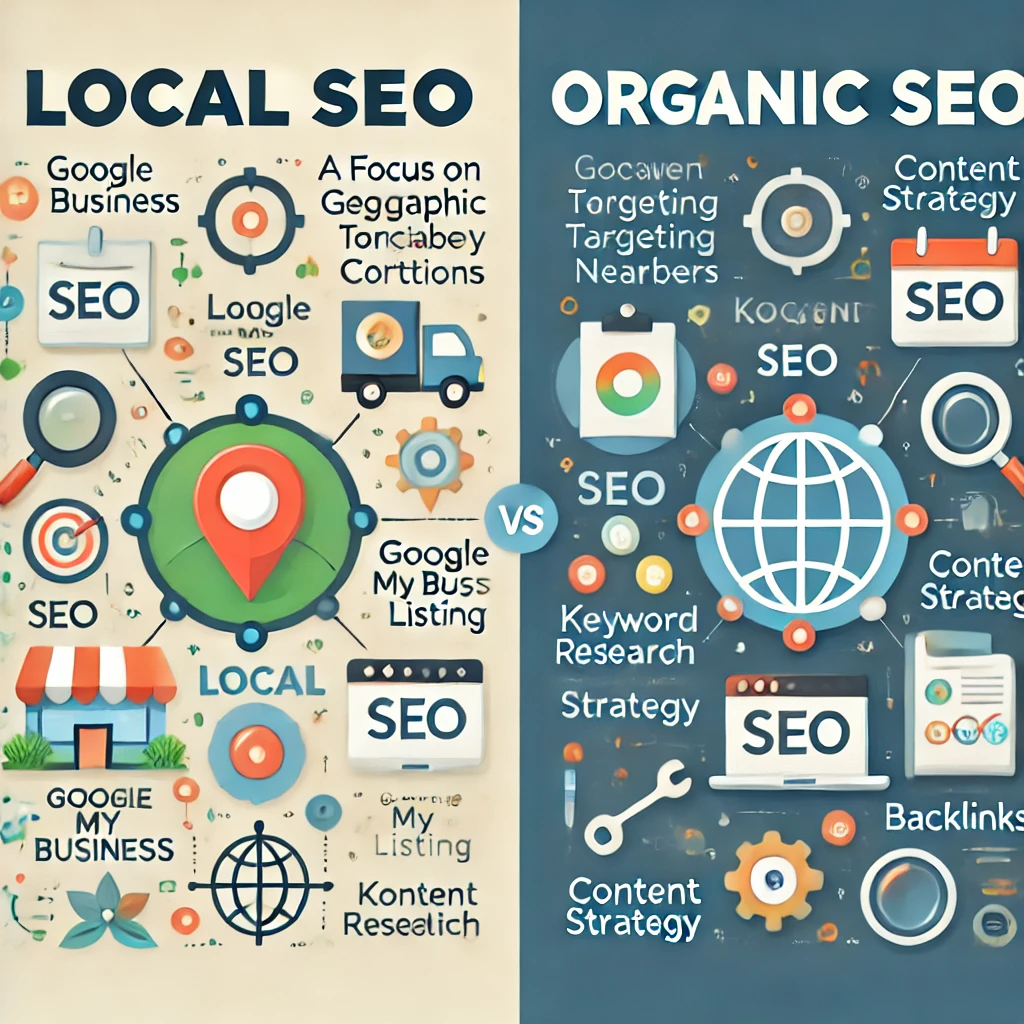Introduction
SEO (Search Engine Optimization) is essential for online visibility and business growth, but not all SEO is the same. Local and organic SEO are two primary branches, each targeting different audiences and purposes. Understanding the difference between local and organic SEO helps businesses choose the right strategy to maximize reach and impact.
Understanding Local SEO
Local SEO focuses on optimizing a business’s online presence to attract more business from local searches on search engines. It is highly location-based, making it ideal for businesses that rely on serving customers within a specific geographical area, like restaurants, gyms, or stores.
- Purpose: The goal of local SEO is to appear in search results for users looking for specific services or products in a particular location.
- Features of Local SEO:
- Google My Business: This is a primary tool, where businesses can create profiles that appear on Google Maps and local search results.
- Local Citations: Building citations with consistent information on directories and sites like Yelp, Yellow Pages, etc.
- Local Keywords: Keywords with geographical terms, such as “SEO services in New York” or “best pizza near me.”
Key Benefits of Local SEO
- Increased Foot Traffic: Effective for businesses that need to attract nearby customers.
- Improved Visibility on Maps: Appearing on Google Maps can increase brand trust.
- Higher Conversion Rates: Local searches often lead to immediate visits, increasing conversion rates.
Understanding Organic SEO
Organic SEO focuses on improving a website’s rankings in non-local, broader search engine results. Unlike local SEO, it doesn’t target specific locations but aims to reach a wider audience on a national or even global scale.
- Purpose: The goal of organic SEO is to rank for relevant keywords to increase overall website traffic.
- Features of Organic SEO:
- On-Page SEO: Optimizing individual pages for keywords, user experience, and loading speed.
- Content Strategy: Developing high-quality, keyword-rich content that answers user queries.
- Link Building: Earning links from authoritative websites to boost domain authority and credibility.
- Technical SEO: Ensuring proper site structure, mobile-friendliness, and fast loading times.
Read More: Why Google E-E-A-T Is Crucial for SEO?
Key Benefits of Organic SEO
- Broader Audience Reach: Helps brands reach a larger audience regardless of location.
- Long-term Strategy: Organic SEO builds a stable foundation for continued growth in traffic.
- Brand Authority: Regularly ranking for popular keywords can establish industry authority.
Local vs. Organic SEO: Key Differences
| Feature | Local SEO | Organic SEO |
|---|---|---|
| Target Audience | Local, geographically specific audiences | Broader, national, or international audiences |
| Goal | Increase visibility in local search and maps | Improve overall search engine rankings |
| Tools | Google My Business, local citations, reviews | Keyword research, content marketing, backlinking |
| Keywords | Include geographical terms (e.g., “near me,” city names) | Broader, non-geographic terms |
| Conversion Rates | Often higher due to local, immediate needs | More varied; depends on niche and content quality |
Integrating Local and Organic SEO Strategies
For many businesses, a blend of local and organic SEO strategies is ideal. For example, a local business can attract nearby customers through local SEO while also building brand authority through organic SEO efforts.
Tips to Combine Local and Organic SEO:
- Optimize for Both Local and General Keywords: Use a mix of geo-specific keywords and general industry terms.
- Leverage Content for Both Audiences: Create blog content that appeals to broader audiences while incorporating local insights for relevance.
- Build Backlinks from Local Sources: Obtain backlinks from local news, blogs, and directories, which benefit both local and organic SEO efforts.
Conclusion
Understanding the difference between local and organic SEO is crucial for businesses to allocate resources effectively. Local SEO is best for reaching nearby customers and improving visibility in geographical search results, while organic SEO is ideal for building a broader audience and brand authority.
FAQs
1. What is the main difference between local and organic SEO?
The main difference lies in their target audiences: local SEO focuses on specific geographic locations, while organic SEO targets broader, non-location-based search queries.
2. Do I need both local and organic SEO?
It depends on your business goals. Local SEO is essential for businesses with a physical location or specific service area, while organic SEO is beneficial for reaching a wider audience online.
3. How does Google My Business impact local SEO?
Google My Business enhances local SEO by allowing businesses to appear in Google Maps and local search results, boosting visibility among nearby customers.
4. Is organic SEO a long-term strategy?
Yes, organic SEO is a long-term strategy focused on increasing overall search visibility and brand authority, and its results can compound over time with consistent efforts.






